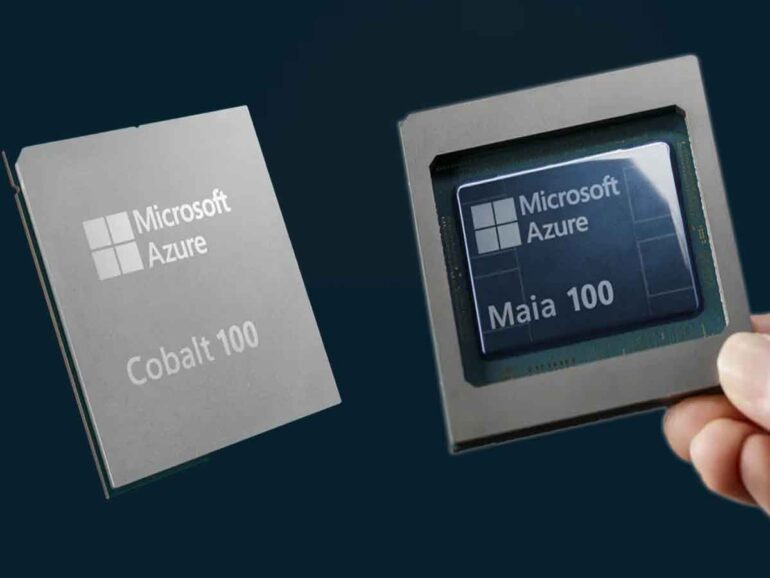TL;DR:
- Microsoft introduces Maia and Cobalt custom chips for Azure cloud.
- Maia designed for language models like GPT-3.5 Turbo and GPT-4.
- Cobalt is a 128-core CPU for conventional computing tasks.
- Both chips are reserved for internal use.
- Microsoft’s goal to lead as “the Copilot company” demands robust computing power.
- Tech firms address the high costs of AI services with custom accelerator chips.
- Microsoft maintains collaboration with third-party chip suppliers.
- Plans to incorporate Nvidia H200 Tensor Core GPU and AMD MI300X-accelerated virtual machines.
- Concrete performance benchmarks are yet to be disclosed.
Main AI News:
In a groundbreaking announcement at the Microsoft Ignite conference, Microsoft introduced two cutting-edge custom chips, poised to revolutionize in-house AI capabilities via its Azure cloud computing service. Meet the Microsoft Azure Maia 100 AI Accelerator and the Microsoft Azure Cobalt 100 CPU, meticulously crafted to fuel the future of AI-driven technology.
The Maia chip is a marvel in itself, purpose-built to handle extensive language models such as GPT 3.5 Turbo and the formidable GPT-4, which serve as the backbone for Microsoft’s Azure OpenAI services and the newly rebranded Microsoft Copilot (formerly Bing Chat). Boasting an impressive 105 billion transistors and manufactured using a state-of-the-art 5-nanometer TSMC process, Maia signifies a monumental leap in AI hardware.
Meanwhile, the Cobalt chip is no slouch either. With its 128-core ARM-based design, it’s primed to tackle conventional computing tasks with remarkable efficiency, including powering Microsoft Teams. Notably, Microsoft has affirmed that it has no intentions of commercializing either of these technological marvels; they are reserved exclusively for internal use, underscoring their strategic importance.
Microsoft’s aspiration to become “the Copilot company” is not without its unique set of challenges, notably the exorbitant costs associated with delivering AI services, often dwarfing those of conventional search engines. This financial hurdle has been a shared concern among tech giants, with Microsoft actively seeking innovative solutions.
Amid the backdrop of chip shortages that have driven up the prices of coveted Nvidia AI GPUs, several industry titans, including Amazon, OpenAI, IBM, and AMD, have ventured into the domain of AI accelerator chip development. Microsoft, too, recognized the necessity of crafting its own custom silicon to elevate its services.
Drawing an analogy to building a custom house, Microsoft highlights the advantages of homegrown chips, allowing them to exert meticulous control over design choices and details. These chips will find their homes on tailor-made server boards, seamlessly integrated into purpose-built racks within existing Microsoft datacenters. The harmonious synergy between hardware and software, co-designed to unlock novel capabilities and opportunities, is poised to be a game-changer.
Microsoft’s venture into chip development is not a debut act. Historically, the company has collaborated on silicon for its Xbox consoles and co-engineered chips for its esteemed line of Surface tablets, showcasing a commitment to pushing technological boundaries.
Yet, Microsoft remains acutely aware of the value of collaboration. The company intends to continue relying on third-party chips, both to address supply constraints and to maintain its intricate web of business partnerships. In a forward-looking move, Microsoft plans to incorporate the latest Nvidia H200 Tensor Core GPU into its fleet next year, facilitating the support of larger model inferencing with minimal latency. Additionally, the deployment of AMD MI300X-accelerated virtual machines to Azure reinforces Microsoft’s dedication to innovation.
While concrete benchmarks for the performance of these chips are yet to be disclosed, Microsoft exudes confidence in their performance-per-watt ratios, particularly emphasizing the prowess of Cobalt. As Wes McCullough, Microsoft’s corporate VP of hardware product development, aptly puts it, “The architecture and implementation are designed with power efficiency in mind.” These efficiency gains, when multiplied across Microsoft’s expansive network of datacenters, promise a substantial impact.
Conclusion:
Microsoft’s Maia and Cobalt chips mark a significant step in reinforcing its AI capabilities via Azure. While maintaining partnerships with third-party chip suppliers, the company’s strategic investment in custom silicon underscores its commitment to staying at the forefront of AI innovation. This move not only addresses cost concerns but also positions Microsoft to lead in the evolving AI services market, setting new standards for efficiency and collaboration.

